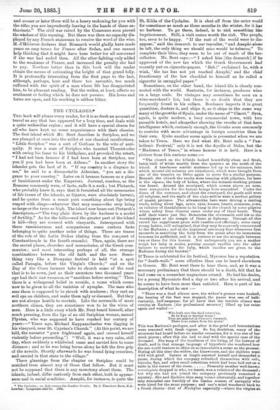THE CYCLADES:* THIS book will please every reader, for it
is as fresh an account of travel as any that has appeared for a long time, and deals with a quite unfamiliar legion ; and it will have a special charm for all who have kept up some acquaintance with their classics. The first island which Mr. Bent describes is Seriphos, and we are plunged at once into the midst of our classical recollections. "Little Seriphos" was a sort of Gotham to the wits of antiquity. It was a man of Seriphos who taunted Themistocles with owing hie fame to his birthplace, and provoked the retort, "I had not been famous if I had been born at Seriphos, nor you if you had been born at Athens." In another story the islander gee the best of it. "If my coantry is a disgrace to me," he said to a disreputable Athenian, "you aro a disgrace to your country." Later on it became famous as a place of banishment under the Emperors. Juvenal, careless, as the Itomans commonly were, of facts, calls it a rock ; but Plutarch, who probably knew it, says that it furnished all the necessaries of life (some of the islands, as Gyaros, were absolutely barren),
and he quotes from a comic poet something about figs being reaped with slings—whatever that may mean—the crop being so large or the trees so high. The island now bears out Plutarch's description,—" The tiny plain down by the harbour is a model of fertility." As for the hills—and the greater part of the island is hill—they are covered with vineyards. Interspersed with these reminiscences and comparisons come curious facts belonging to quite another order of things. There are traces of the rule of the Latin Dukes (dating from the conquest of Constantinople in the fourth crusade). Then, again, there are the sacred places, churches and monasteries, of the Greek communion; and most interesting perhaps of all, the strange combinations between the old faith and the new. Something very like a Dionysiac festival is held "at a spot called Panagia, before the Virgin's Church;" and on the Day of the Cross farmers take to church some of the seed that is to be sown, just as their ancestors two thousand years ago had their ifrpci wpospum, or "sacrifices before sowing." Then there is a widespread belief in nereids, a name which seems now to be given to all the varieties of nymphs. The man who sees them is supposed to be struck with madness; they cast an evil eye on children, and make them ugly or diseased. But they are not always hostile to mortals. Like the mermaids of more northern climes, they are sometimes won to be the wives of men. Here is a little story which Mr. Bent heard himself, after mach pressing, from the lips of an old Seriphian woman, named Flyntas, who was supposed to have reached her century of years—"Years ago, Michael Kappazacharias was digging in his vineyard, near St. Cyprian's Church." (At this point, we are told, the narrator "grew frightened again, and crossed herself violently before proceeding.") "Well, it was a very calm, still day, when suddenly a whirlwind came and carried him to some distance ; and as he was being borne along he felt the firm grip of the nereids. Shortly afterwards he was found lying senseless, and carried in that state to the village."
These gleanings from the chapter on Seriphos could be matched from almost any of those that follow. But it mast not be supposed that there is any monotony about them. The islands, indeed, differ curiously from each other, both in appearance and in social condition. Anaphi, for instance, is quite the St. Kilda of the Cyclades. It is shut off from the outer world for sometimes as much as three months in the winter, for it has no harbour. To go there, indeed, is to risk something like imprisonment. Still, a visit seems worth the risk. The people, too, seem to be happy. "If the rest of the world were to disappear," said the deinarch to our traveller, "and Anaphi alone be left, the only thing we -should miss would be tobacco." To complete their bliss, they seem to be out of reach of the taxcollector. Mr. Bent says :—" I asked him [the demarch] if he approved of the new tax which the Greek Government had recently put on cigarette-papers. Bah ! ' exclaimed he, with .16 wink, 'the tax has not yet reached Anaphi,' and the chief functionary of the law chuckled to himself as he rolled a cigarette in smuggled paper."
Sometimes, on the other hand, the island life is closely connected with the world. Santorin, for instance, produces wine on a large scale. Its vintages may sometimes be seen on a wine-merchant's list, but there is no doubt that they are frequently found in his cellars. Bordeaux imports it in great quantities', doctors it, and ships it, as it ships in the same way many of the growths of Spain, under the name of" Claret." Syra, again, is quite modern, a busy commercial town, with two passable hotels, and altogether showing the results of that keen intelligence which, curiously enough, the Greeks seem commonly
to exercise with more advantage in foreign countries than in
their own. Quite another scene again is presented when we are taken to Tenos. Here we find what Mr. Bent calla a "Pan
hellenic Festival," only it is not the Apollo of Delos, but the "Madonna of Tenos," in whose honour it is held. Here is a picture from this curious scene :— "The church on the hillside looked beautifully clean and fresh, being built of white marble from the quarries at the north of the island. A handsome marble staircase led up to the entrance, into which several old columns are introduced, which were brought from one of the temples on Delos again to serve for a similar purpose. Beneath the church the vaults were teeming with pilgrims, for hero is the efferis, the holy of holies, where the miracle-working picture was found. Around the courtyard, which coven' above an acre, were receptacles for the human beings here assembled. Under the dome of the entrance, and about the courtyard, the goods sold were all religious, and the stalls of the thaw-sellers were a perfect gallery of quaint pictures. The silversmiths here were driving a rattling trade, selling silver lags, arms, eyes, houses, hearts, steamers, cows, as tributes of thankfulness to be hung in the church by some pilgrim whose safety from disaster came under any of these heads. They sold their wares just like Demetrius the silversmith sold his to the worshippers at the temple of Diana at Ephesus. Through all this crowd the supplicants press with candles and offerings ; some carry young babies, still unbaptiaed, that they may be expressly consecrated to the Madonna ; and at the baptismal ceremony here whosoever first succeeds in snatching the baby from the priest after its immersion becomes its godfather, and it is curious to see the struggle between two or three for this honour. Not unfrequently you see a mother weigh her baby in scales, putting enough candles into the other balance to outweigh the baby, which candles are given to the Madonna during the festival."
If Tenos is celebrated for its festival, Myconos has a reputation for "death-wails" more effective than can be heard elsewhere in Greece. Mr. Bent went there to hear them, and, as it was a necessary preliminary that there should be a death, felt that he had come on a somewhat ungracious errand. He had his desire, for a young Ifyconiote died a day or two after his arrival, and
he seems to have been more than satisfied. Here is part of his description of what he saw :—
"There was a dead silence now, the widow's groans were hashed, the beating of the feet was stopped, the pause was one of halfcariosity, half-suspense, for all knew that the terrible climax was coming as Zachara, [the professional mourner] lifted up her voice again and wailed :— 'Who bath seen the dead returning, Be he king or warrior brave ? They are planted in Charon'. vineyard, There is no return from the grave.'
This was Zachara's prologue, and after it the grief and lamentations were renewed with fresh vigour. So far, doubDese, many of the mourners had heard before on similar occasions, for it was one of her stock pieces ; after this she had to deal with the special case of the deceased. She sang of the loneliness of the living, of the horrors of death, and in that strange language of hyperbole she wondered how the sun could venture to shine on so lamentable a acme as the present. During all this time the widow, all3 kinswomen, and the children were wild with grief. Nature at length asserted herself and demanded a pause, during which the company refreshed themselves with raki, biscuits, figs, and other small refections which had been laid out on a
table in the corner of the room Presently another well-known
nurrologista dropped in who, we learnt, was a relative of the deoeased ; but why she had not joined the company previously remained a mystery. She and Zachara then sang verses alternately, and together they reminded one forcibly of the Darien women of Antiquity who were hired for the same purpose ; and one's mind wandered back to a Greek chorus—that of Aschybis especially—where the virgins at. the gate of Agamemnon indulge in all the most poignant manifestations of grief, beating their breasts, lacerating their cheeks, and rending their garments ; and I could not but admire the prudence of Solon, who forbade the excessive lamentations of women (Plat. 'Sol.' niL and xxi.) This prolonged agony of mourning continued for two long hours; occasionally, to relieve the paid lamenters, some of the kinswomen would take up their parable and sing a verse or two, sending messages of love and remembrances to friends who had gone before to the shades of Hades ; and great was my relief when the priests arrived with their acolytes bearing the cross and the lanterns to convey the corpse to the grave."
" Charon " seems to be the common synonym for death. The "ferryman of Orcus " here has not given way to the media3val Death, the skeleton with the scythe. His passage-money still is paid, and is still called vaD1tosi ; only now it is not an obol, but a little wax cross with "I. X. N.," "Jesus Christ Conquers," upon it. We take leave of Mr. Bent, with hearty acknowledgments and thanks for a most charming volume.



































 Previous page
Previous page